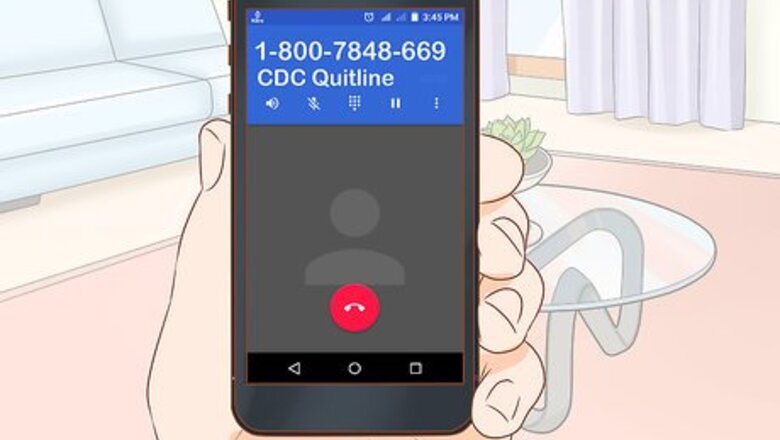
views
X
Research source
Changing Your Diet and Lifestyle

Get help to quit smoking as soon as possible. If you smoke, quitting smoking will play a big role in unblocking your arteries. Quitting can be extremely difficult, but it's not impossible. Create a plan to quit and get help from your doctor. Call the CDC quitline at 1-800-QUIT-NOW or visit their website (https://www.cdc.gov/tobacco/campaign/tips/quit-smoking/index.html?s_cid=OSH_tips_D9385) for additional resources. Tell your friends and family about your plan to quit so they can support you. Quitting smoking is not something you should feel like you have to do all on your own. There are prescription medications and nicotine replacement therapies, such as the patch, that can help ease your cravings for nicotine and lessen withdrawal symptoms.
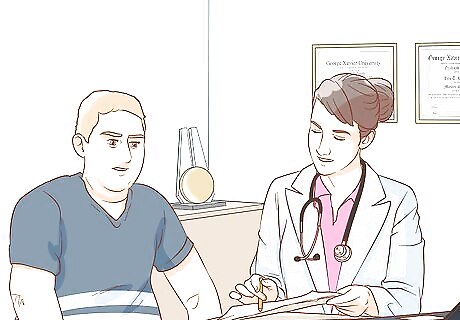
Make a plan to lose excess weight if you are overweight. The right weight for you depends on your gender, height, and body composition. However, carrying too much weight can cause excess strain on your heart and put you at greater risk of having clogged arteries. Avoid fad diets that promise you'll lose a lot of weight fast. Instead, work with your doctor to create a plan to lose weight gradually while making significant lifestyle changes that will ensure you keep that weight off. You can also follow the dietary guidelines of the American Heart Association (AHA): 6 to 8 servings of grain per day, at least half of which are whole grains; 3 to 5 servings of vegetables per day; 4 to 5 servings of fruit per day; 2 to 3 servings of fat-free or low-fat dairy per day; 3 to 6 oz. of lean meat, poultry, or seafood per day (about the size of a deck of cards); 2 to 3 servings of fats and oils, such as canola oil or olive oil, per day; 3 to 5 servings of nuts, seeds, and legumes per week 5 or fewer servings of sweets or sugars per week
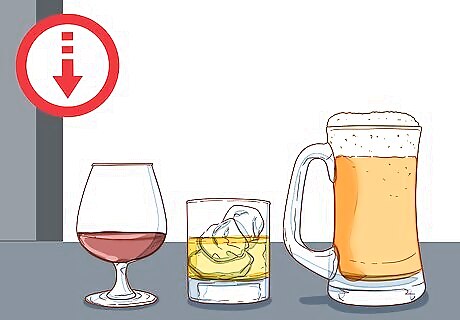
Limit alcohol intake to 1 or 2 drinks a day. In addition to a healthy, balanced diet including plenty of whole foods, the AHA recommends female-bodied people only have 1 drink a day. Male-bodied people can have up to 2 drinks a day. If you have difficulty controlling your alcohol intake or find it impossible to drink without drinking to excess, talk to your doctor or seek other treatment, for example from a therapy or support group. Alert your friends and family members about your desire to limit your drinking. They can help keep you accountable when you are out with them in social settings.
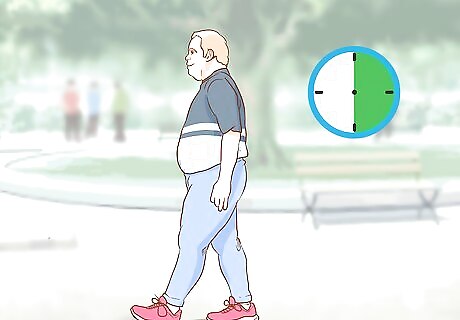
Exercise for at least 30 minutes 6 days a week. A regular exercise program improves your cardiovascular health and will help lower your blood pressure. If you transition to a more active lifestyle, you can slow the buildup of plaque in your arteries. Start slow and be patient with your body through this transition. Your 30 minutes doesn't have to be all at once. Especially if you haven't exercised in a while, you may find it difficult to go for that long at first. If all you can handle is a 5-minute walk, go for a 5-minute walk. Then take another 5-minute walk 2 hours later. Eventually, you'll build up your stamina, but it may take some time. If you have difficulty getting started or sticking with an exercise plan, try making the commitment with a friend or family member who will keep you accountable.Tip: If you can't handle high-impact exercise, such as running, try a low-impact exercise, such as cycling, swimming, or yoga.
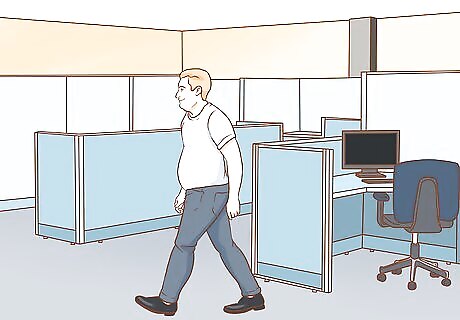
Walk every day in addition to your regular exercise. Walking improves your cardiovascular health and can help unblock your arteries, especially if the arteries in your legs are affected. A brisk, 10-minute walk once or twice a day will improve your condition. You can also incorporate more walking into your regular daily life. When you go to a store or office, park further away and walk across the parking lot. Take the stairs instead of using the elevator, or walk to a colleague's office rather than sending them an email. These little activities will build up over the course of the day.
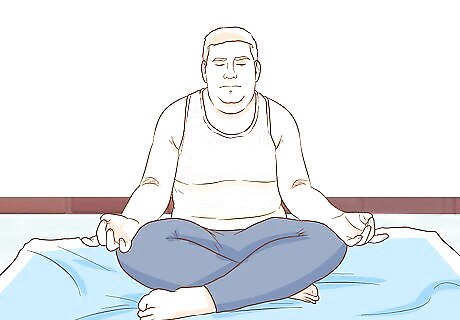
Do what you can to reduce the stress in your life. Stress causes significant damage to your body and can increase your blood pressure. While you can't necessarily eliminate everything that causes stress, you can change the way you react to stressful situations. Try meditating to help reduce stress. Simply pausing for a minute several times a day to focus on your breath and breathe deeply can help calm the body. A daily yoga practice can enable you to get your exercise in as well as create a sense of calm that helps you reduce the effects of stress.
Taking Drugs or Supplements
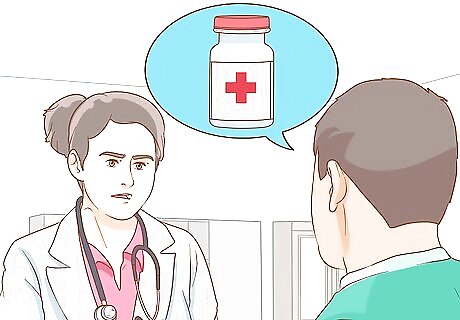
Ask your doctor about cholesterol-modifying medications. If you have high cholesterol, particularly LDL or "bad" cholesterol, this will increase the amount of fatty material deposited in your arteries. Cholesterol-lowering medications help decrease that amount to gradually unblock your arteries. There are various classes of drugs that are used to lower cholesterol: Statins, such as atorvastatin (Lipitor) or rosuvastatin (Crestor) Bile acid sequestrants, such as colestipol (Colestid) Cholesterol absorption inhibitors, such as ezetimibe (Zetia) Fibric acid derivatives, such as gemfibrozil (Lopid) or fenofibrate (Tricor), which are typically used to bring down high triglycerides PCSK9 inhibitors, such as alirocumab (Praluent) and evolocumab (Repatha), which are reserved for those failing statins and cholesterol absorption inhibitors Omega-3s (found in fish oil and flaxseed), which may help decrease high triglyceridesTip: If you don't respond well to a drug in a single class, your doctor may prescribe you a combination of 2 different classes.
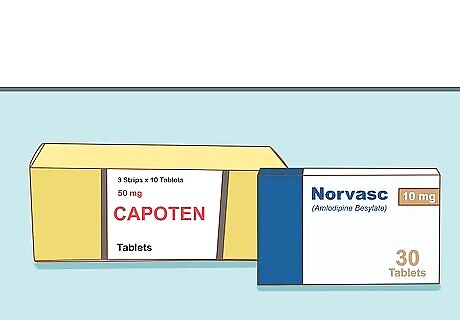
Use medication to lower your blood pressure. There are 5 classes of drugs that lower blood pressure. As with cholesterol-lowering drugs, your doctor may prescribe more than one medication from different classes, depending on your particular condition. The classes of drugs that lower blood pressure are: Angiotensin converting enzyme (ACE) inhibitors, such as captopril (Capoten) or lisinopril (Zestril) Calcium channel blockers, such as amlodipine (Norvasc) or Bepridil (Vascor) Angiotensin II receptor blockers (ARBs), such as irbesartan (Avapro) or valsartan (Diovan) Diuretics, such as hydrochlorothiazide or chlorthalidone Beta blockers, such as atenolol (Tenormin) or bisoprolol (Zebeta), which are only used in those with cardiovascular disease including a prior heart attack or heart failure
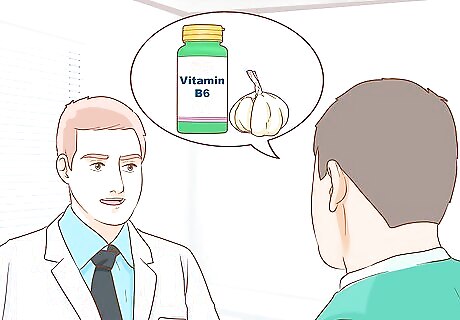
Talk to your doctor about taking herbal or nutritional supplements. There are many herbal and nutritional supplements that can accomplish many of the same things prescription medications can do. However, many of these interact with each other or with medications you're already taking in dangerous ways. Your doctor can assess whether a particular supplement would likely benefit you, based on your situation and your health needs. Some supplements commonly used to treat clogged arteries include: Folic acid (400 mcg per day), vitamin B6 (25-100 mg per day), vitamin B12 (2-100 mg per day), antioxidant vitamins (beta-carotene, C, and E), and vitamin D; Coenzyme Q-10 (CoQ10), which may boost levels of antioxidants in your blood and prevent heart attacks; Omega-3 acids, found in fish oils, which may prevent the development of plaque and blood clots; Garlic, which may lower cholesterol levels and destroy plaque in the arteries; and Psyllium, which may lower both cholesterol levels and blood sugar levels.
Seeking Additional Medical Treatment
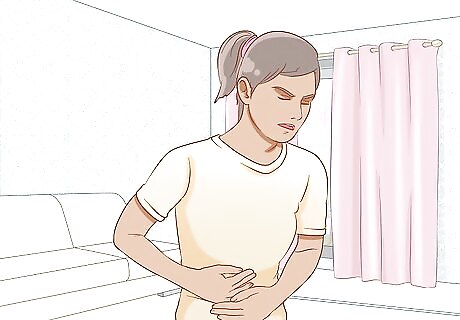
See your doctor as soon as you notice symptoms of blocked arteries. People often don't notice any symptoms of clogged or blocked arteries until an artery is at least 40 percent blocked. If you notice any of these symptoms, you should see your doctor as soon as possible. Symptoms vary depending on the arteries that are blocked, but include: For narrowing of the heart arteries: chest, abdominal, back, or shoulder pain; weakness; excessive perspiration; shortness of breath For clogged arteries that supply blood to the brain: weakness or paralysis on one side of your body; trouble speaking or understanding speech; loss of vision in one eye; muscle weakness; dizziness; loss of balance or coordination; sudden severe headache For blocked arteries that supply your arms and legs with blood: pain, cramps, aching, or numbness in your legs during exercise or walking; hair loss; thickened nails; skin that is cold to the touch; skin with a smooth, shiny surface; gangrene
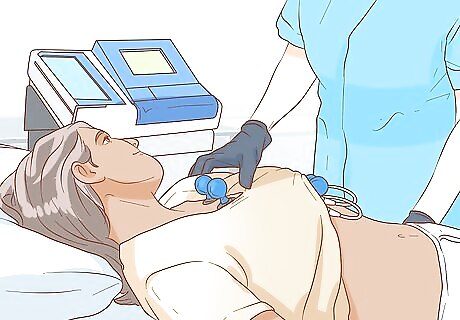
Undergo diagnostic testing to reveal the extent of the blockage. When you visit your doctor, they will review your medical history and do a complete physical exam. This exam will likely include routine blood tests. Following those blood tests, they may recommend additional testing to assess the degree of blockage in your arteries, including: An electrocardiogram (ECG), which reveals evidence of a previous heart attack or one currently in progress; An echocardiogram, which can identify parts of your heart that are moving weakly; A stress test, in which your heart is monitored while you walk on a treadmill or ride a stationary bike; A cardiac catheterization and angiogram, which views blood flow through your heart to check for blockages; or A heart scan, which helps your doctor see calcium deposits in your arteries.Tip: If you have palpitations, your doctor may advise you to wear a Holter Monitor to record the electrical activity of your heart over days or weeks while you go about your normal daily activities.
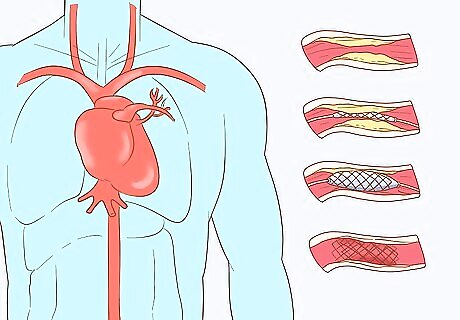
Try angioplasty to widen your blood vessels. Your doctor can use this non-surgical technique to widen arteries that are excessively narrowed. A catheter with a deflated balloon is inserted in the narrowest part of the artery. The balloon is then inflated to widen the artery. In some cases, wire mesh (known as a stent) will be placed in the artery to permanently hold it open so the blood can flow smoothly.
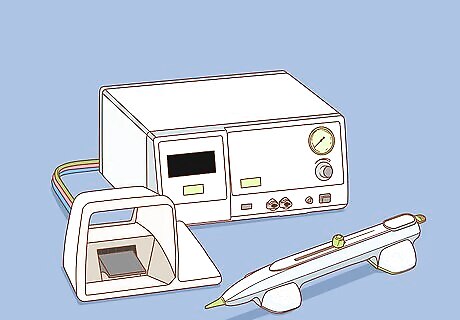
Get atherectomy to remove plaque from your arteries. An atherectomy is a non-surgical procedure similar to angioplasty. However, with this procedure, a rotating shaver or laser on the catheter actually removes plaque from the walls of your arteries to open up a narrow passage.
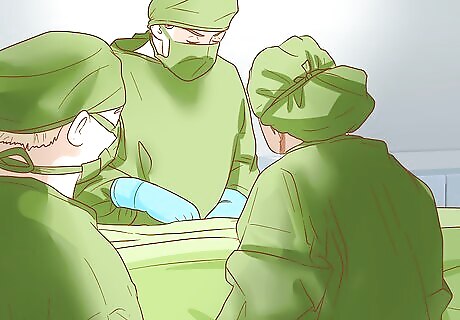
Use surgical treatment as a last resort. If angioplasty or atherectomy are not viable options for you, bypass surgery may be your best option to improve your situation and reduce the risk of heart attack or stroke. With bypass surgery, a surgeon uses an artificial tube or a blood vessel from another part of your body to reroute the blood around the blocked artery. Bypass surgery is major surgery that will require several days in the hospital and several weeks of recovery afterward. However, it is one of the most effective procedures to permanently manage blocked arteries.




















Comments
0 comment